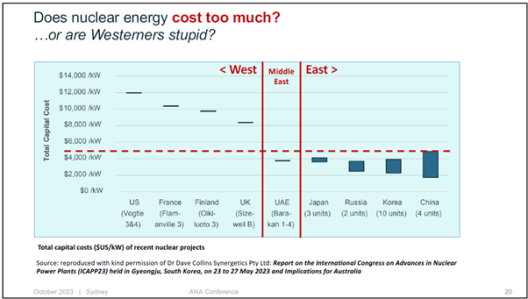Queensland leaders need to show maturity
 |
Graham Young, Executive Director of the Australian Institute for Progress, welcomed the announcement by Opposition Leader Peter Dutton that a government he led would build 7 nuclear reactors on the sites of existing coal-fired power stations.
“We welcome Peter Dutton’s bravery and honesty in being open about this policy and the need for it, well before the next election.
“As a Queensland-based institute we are frankly appalled at the opposition to nuclear of the Steven Miles’ state government, and the David Crisafulli opposition. Neither is showing any leadership, and the arguments being used against nuclear are plainly wrong.
“Queensland currently has a plethora of emissions targets, and the only way we will meet most of them without bankrupting the state or blacking it out, is if we can deploy a zero emissions form of dispatchable energy.
“Nuclear power is the only form of dispatchable, emissions-free energy currently in existence.
“Either we are serious about our emissions targets, in which case we will adopt nuclear, or the targets are just extraordinarily expensive greenwashing meant to keep voters at bay.”
Mr Young said that the arguments run by the government against nuclear do not stand up.
“We need a mature debate on energy as we are dealing with people’s lives and livelihoods. Cheap student debating points and one-liners meant to scare voters are no substitute for genuine policy debate.
“Peter Dutton is to be praised for bringing maturity to the debate. Queensland’s state leaders need to grow up.”
Bad arguments
Too expensive
There is a wide range in costs of nuclear reactors around the world, and the Miles government has opportunistically chosen Hinkley in the UK, one of the most expensive, to base its criticism on. The graph above shows a number of international comparisons.
China is currently building 24 nuclear reactors, and plans to have 10% of its electricity generated by nuclear by 2035 and 18% by 2060. China thrives by being the lowest cost economy in which to manufacture.
At COP 28 20 countries pledged to triple nuclear generation by 2050 – they did not do this because nuclear is “too expensive”. The list includes: United States, Armenia, Bulgaria, Canada, Croatia, Czech Republic, Finland, France, Ghana, Hungary, Jamaica, Japan, Republic of Korea, Moldova, Mongolia, Morocco, Netherlands, Poland, Romania, Slovakia, Slovenia, Sweden, Ukraine, United Arab Emirates, and United Kingdom.
NetZero Australia estimates the energy transition cost at $9 Trillion by 2060 and $1.5 trillion by 2030 based on renewables and gas, with carbon capture and storage. Australia’s total generation capacity could be met by 34 GW of nuclear capacity without any investment in additional network, which on international costings would range between $207 Bn for Japanese reactors, or $647 Bn for the most expensive US ones.
Pumped Hydro is better
This is a false comparison which is technologically incompetent. Pumped hydro is not a source of power, it is only storage. It needs an equivalent amount of electricity to be generated elsewhere, inflating the real costs massively. It will only work sporadically to backup the network when required.
By contrast nuclear generates electricity and will do this for 90-95% of the time. It does not need another power source to work. Latest estimates of the Pioneer-Burdekin pumped hydro scheme are a cost of $18 billion for 5 GW of nameplate capacity that will run less than 50% of the time. This equates to a price somewhere within the range of nuclear, without considering the capital cost of generating electricity to fill the system after each time it is used.
Waste is a problem
Australia’s ANSTO solved the waste problem in the 70s with its Synroc product which allows spent nuclear fuel to be stored underground in a synthetic rock. Since then reactors have been developed that can use refined spent fuel.
As the Federal Opposition Leader, Peter Dutton, pointed out, the actual waste from nuclear reactors is quite small, and storage will not be a problem.
Voters won’t accept nuclear
All the most recent polling, including our own, says more people are in favour of nuclear than not. With clear rational arguments the gap will widen even more. Polls are a guide only as the results of The Voice referendum demonstrate. Good leaders do what is right, and bring voters along with them.